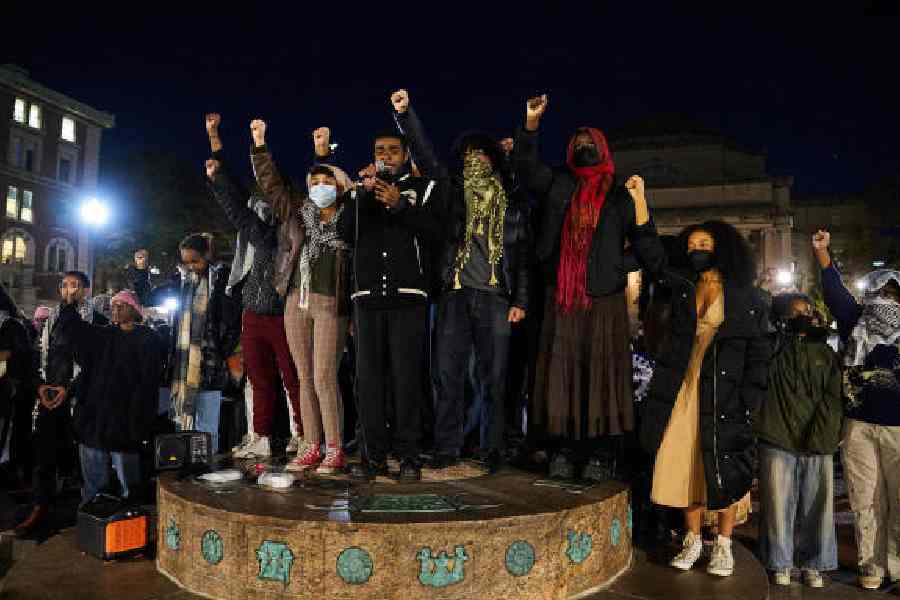Yesterday once more: Those protesting war in Gaza owe their Vietnam-era forerunners one legacy


Richard Flacks remembers the challenges of building a protest movement during the Vietnam War as a pillar of the Left-wing political and anti-war group Students for a Democratic Society (SDS) during the 1960s.
“SDS began with the idea of, ‘We need a new way of being on the Left, a new vocabulary, a new strategy,’” said Flacks, who helped write the group’s manifesto, the Port Huron Statement, in 1962. “We knew we were right, and I don’t think we were arrogant about it.”
Sixty years later, Iman Abid sees similar challenges in the war in the Gaza Strip. “For so long, we couldn’t get Palestine to be that issue people care about,” said Abid, the organising and advocacy director at the US Campaign for Palestinian Rights, which works with pro-Palestinian campus organisations. “But now people care about it because they’re seeing it. They’re watching it on their social media. They’re watching it on the news.”
It is too early to know whether the Israeli-Palestinian conflict will define this generation as opposition to the Vietnam War did for many young people more than a half century ago.
But to many who have lived through the Vietnam era, the parallels to the Gaza protests are compelling. Miles Rapoport, a former secretary of state of Connecticut, who joined SDS while studying at Harvard University, US, saw similarities but said the two movements and moments differ in a fundamental way: the US waded into Vietnam in a show of superpower hubris. Israel , he said, is fighting for its existence after a terrorist attack that killed 1,200. The current war “has a lot more moral and philosophical nuance.”
That is reflected in more pro-Israel marches and demonstrations now than was common on campuses in support of the war during the Vietnam era.
To critics of the Gaza protests, the current movement reflects the excesses, not the virtues, of the Vietnam protests, with chants that to some suggest genocide against the Jewish people.
Many supporters of Israel view the movement with a mixture of horror and consternation. Kenneth L. Marcus, chair of the Brandeis Center for Human Rights Under Law, US, a Jewish civil rights institution not affiliated with Brandeis University, said the campus demonstrations began even before Israel’s invasion of Gaza occurred.
“Students didn’t have much in 1960 to emulate,” said Flacks, a professor emeritus of sociology at the University of California, Santa Barbara, US. “A lot of the tactics invented at that time became part of the tool kit for activism on campuses.”
The Vietnam anti-war movement was overwhelmingly white, like most campuses of the 1960s. But campuses in 2023, particularly urban ones, contain far more students of colour, many of whom empathise with Palestinians’ status as an embattled population under the control of a more powerful force. And non-students are a bigger part of protests now.
“Movements don’t come out of nowhere,” said Michael Kazin, a Georgetown University historian who in the 1960s was a member of SDS. For the Vietnam protesters, he said, the precursors were the 1960 Sharpeville Massacre in South Africa and the civil rights movement. For the Gaza protesters, the antecedents stretch from the anti-Muslim backlash after the 9/11 attacks to recent racial injustice protests.
When young protesters descended on Ferguson, Missouri, US, after police officers killed an unarmed Black man in 2014, Palestinians offered advice on social media for coping with tear gas. Today, at the University of California, Santa Barbara, US, and elsewhere, Black and Latino students are among the leaders of the pro-Palestinian movement, Flacks said.
And both eras reflect the influence of deeply polarising political leaders, particularly Presidents Lyndon Johnson and Richard Nixon in the Vietnam era, and Prime Minister Benjamin Netanyahu of Israel, whose hard-line conservatism has given oxygen to campus support for the Palestinian cause.
“Those of us who are my age have direct memories of why Israel was a morally positive framework. It was the haven for people escaping from the worst oppression,” Flacks said. But “what the kids in college now see is a government led by Benjamin Netanyahu,” which they view as a repressive force supported by established Jewish organisations.
NYTNS